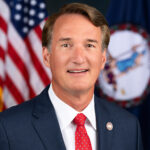Virginia Gov. Glenn Youngkin has returned a “bad faith” insurance claims bill to the General Assembly with recommendations for changes, disappointing property/casualty insurers that were hoping he would veto the measure.
Youngkin’s action keeps the measure alive for reconsideration by lawmakers, who can accept his changes by majority vote or revive the original bill by a two-thirds vote in both the House and Senate. The original bill passed the House 65-32-1 and the Senate, S 30-9-1.
The bill is subtitled a remedy for “arbitrary refusal of motor vehicle claims.” It would require an insurer found acting in bad faith in handling a claim to pay double damages.
Insurers insist the measure is unnecessary and will encourage more lawsuits against insurance companies.
Double Damages
Under the measure (Senate Bill 256), if a personal or commercial auto insurance company denies, refuses, or fails to pay property damage, medical expense benefit, or loss of income benefit claims submitted its policyholders, and a court finds the carrier to be acting in bad faith, the insurer must pay the policyholder double the judgment amount plus interest, attorney fees, and expenses.
Virginia Governor Faces Decision on Bad Faith Bill Opposed by Auto Insurers
It would also require the same of insurers on third-party claims of $3,500 or less, and on uninsured/underinsured motorist (UM/UIM) claims of up to $500,000 for personal injury or wrongful death.

Youngkin recommended several changes including requiring claimants to provide insurers the details of their demand and give their insurer 45 days to respond. He also wants the new law to apply only to any claim for personal injury or wrongful death arising out of a motor vehicle accident that occurs on or after July 1, 2024.
The bill’s supporters, including trial lawyers, say the measure protects consumers in the few instances where an insurer is found to have acted in bad faith. They claim it simply returns the law to what it was before a 2017 state Supreme Court ruling. Mark Dix, of the Virginia Trial Lawyers Association, told lawmakers that before that decision, it had been assumed that “auto insurers had a duty to operate in good faith with their own insureds.” But since that decision, that duty doesn’t arise until after judgment, which he claimed has prompted some auto insurers to make lowball offers or no offers to their own insureds.
Dix told lawmakers that SB256 “incentivizes the auto insurers to treat their own insureds at least as fairly as they treat third parties.”
Industry Groups
Both the American Property Casualty Insurance Association (APCIA) and the National Association of Mutual Insurance Companies (NAMIC) said they welcome the governor’s attention to the measure but they believe that his proposed amendments may reduce the harmful effects, but they will not eliminate them.
APCIA has warned that SB256 will “open the floodgates of litigation against insurance companies by establishing an onerous first-party bad faith law,” which the trade group said only a few other states have enacted.
A study done for APCIA estimated the measure could raise motor vehicle insurance premiums for consumers and businesses from 5.6% to 14.3%.
Insurers also contend that SB256 is unnecessary because Virginia already has an unfair claims settlement law and the insurance regulator can act on consumer complaints about under-and-uninsured motorist claims.
“This bill would make it easier to file ‘gotcha’ lawsuits accusing insurers of negotiating in bad faith, so that settling questionable claims is the least costly option,” claimed Matt Overturf, regional vice president, NAMIC. He pointed to California, Florida, and New Jersey as among the states with similar bad faith provisions that have seen increased “abusive litigation” as a result.
“In any form, NAMIC believes this bill is redundant of existing consumer protections and will increase abusive litigation. Those lawsuits will pile on to already mounting pressures like inflation that drive up insurance costs for consumers. The amendments would limit the extent of this abuse, but would likely not eliminate it,” said Overturf after learning there was no veto.
Nancy Egan, vice president of state government relations for APCIA, said that her group will “continue to focus on protecting consumer affordability and defending against efforts to inject fraud and abuse into Virginia’s legal system, which ultimately drives up consumer costs.”
Youngkin completed action on the 1,046 bills sent to him during the 2024 General Assembly session. In total for the 2024 legislative session, he signed 777 bills, amended 116 bills and vetoed 153 bills.
Was this article valuable?
Here are more articles you may enjoy.


 AIG’s Zaffino: Outcomes From AI Use Went From ‘Aspirational’ to ‘Beyond Expectations’
AIG’s Zaffino: Outcomes From AI Use Went From ‘Aspirational’ to ‘Beyond Expectations’  Florida Regulators Crack the Whip on Auto Warranty Firm, Fake Certificates of Insurance
Florida Regulators Crack the Whip on Auto Warranty Firm, Fake Certificates of Insurance  State Farm Adjuster’s Opinion Does Not Override Policy Exclusion in MS Sewage Backup
State Farm Adjuster’s Opinion Does Not Override Policy Exclusion in MS Sewage Backup  Zurich Insurance Profit Beats Estimates as CEO Eyes Beazley
Zurich Insurance Profit Beats Estimates as CEO Eyes Beazley 

